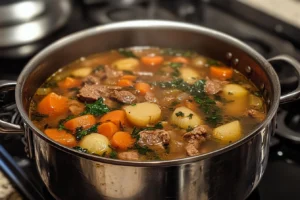What Soup Can You Eat on Carnivore? It’s a question that often arises when people transition to this meat-based diet. The carnivore diet, known for its simplicity and potential health benefits, can seem restrictive, especially when it comes to comfort foods like soup. However, with a little creativity and the right ingredients, you can enjoy delicious and nutritious soups that align perfectly with your carnivore lifestyle.
The Amazing Carnivore Diet and Soup
The carnivore diet primarily consists of animal products, eliminating plant-based foods entirely. This includes meat, fish, poultry, eggs, and certain dairy products. Therefore, traditional soups loaded with vegetables, grains, and legumes are off-limits. The goal is to obtain nutrients from animal sources, which many believe can improve digestion, reduce inflammation, and promote overall well-being. This makes choosing the right soup ingredients crucial.
Image Placeholder: alt text includes What Soup Can You Eat on Carnivore? A bowl of bone broth with visible marrow.
Essential Carnivore Soup Ingredients
To create a carnivore-friendly soup, you need to focus on animal-based ingredients. The foundation of any good carnivore soup is high-quality bone broth, which is rich in collagen, gelatin, and essential minerals. Meat is the next critical component, offering protein and fat. Consider using beef, chicken, lamb, or fish, depending on your preference. Salt is also key for flavor and electrolytes.
Bone Broth: The Unsung Hero
Bone broth isn’t just a base; it’s a powerhouse of nutrients. Simmering bones for an extended period releases collagen, which supports joint health and skin elasticity. Gelatin, another byproduct of bone broth, aids in digestion and gut health. Moreover, bone broth contains essential minerals like calcium, magnesium, and phosphorus. The long simmering process also allows for the extraction of glutamine, an amino acid crucial for gut health and immune function.
Meat: The Protein Powerhouse
The meat you choose will significantly impact the flavor and nutritional profile of your soup. Beef provides a rich, savory flavor and is packed with iron and zinc. Chicken is a leaner option that offers a milder taste and is a great source of protein. Lamb brings a distinctive, slightly gamey flavor and is rich in B vitamins. Fish, such as salmon or cod, adds healthy fats like omega-3 fatty acids, important for brain health and reducing inflammation. Choosing different cuts of meat, like chuck roast for beef, or bone-in chicken thighs, can further enhance the flavor and nutrient density of your soups.
Animal Fats: Flavor and Satiety
Fat is an essential part of the carnivore diet, providing energy and aiding in nutrient absorption. Adding animal fats like tallow, lard, or ghee to your soup not only enhances its flavor but also increases its satiety. These fats are derived from rendered animal tissues and are free of carbohydrates and plant-based additives. Tallow, rendered beef fat, is particularly rich in conjugated linoleic acid (CLA), a fatty acid with potential anti-cancer and weight-loss properties. Lard, rendered pork fat, adds a smooth, creamy texture to soups. Ghee, clarified butter, has a nutty flavor and is often well-tolerated by individuals with lactose intolerance.
Image Placeholder: alt text: Different types of meat suitable for carnivore soup. Close-up of beef, chicken, and lamb.
7 Incredible Carnivore Soup Options
Here are seven amazing soup ideas that adhere to the carnivore diet guidelines, offering variety and deliciousness while keeping you on track. These soups aren’t just meals; they are nutritional powerhouses.
1. Classic Bone Broth Soup
This is the most basic and perhaps most beneficial carnivore soup. Simmer beef, chicken, or lamb bones for 12-24 hours to extract maximum nutrients. Season with salt and pepper to taste. This simple soup is incredibly nourishing and easy to digest. You can also add a splash of apple cider vinegar to help draw out more minerals from the bones.
2. Beef Marrow Soup
Add beef marrow bones to your bone broth for an extra dose of nutrients and flavor. Marrow is rich in fat and contains stem cells that are beneficial for health. Simmer the bones until the marrow is soft and easily scooped out. Season with salt and pepper. Roasting the marrow bones before adding them to the broth can deepen the flavor profile.
3. Chicken Thigh Soup
Use chicken thighs instead of leaner chicken breast for a richer, more flavorful soup. Chicken thighs are higher in fat and connective tissue, which contribute to a silky texture. Simmer the thighs in bone broth until tender, and shred the meat before serving. Salt and pepper are your friends. Adding a bit of rendered chicken skin or schmaltz can further enhance the richness of the soup.
4. Lamb Shank Soup
Lamb shanks are perfect for making a hearty and flavorful carnivore soup. They are rich in collagen and connective tissue, which creates a thick and gelatinous broth. Simmer the lamb shanks in bone broth until the meat falls off the bone. Season generously with salt and pepper. For an extra layer of flavor, consider browning the lamb shanks before simmering them in the broth.
Image Placeholder: alt text: Rich and flavorful Lamb Shank Soup, a perfect carnivore meal.
5. Fish Bone Broth Soup
Use fish bones and heads to make a nutrient-rich fish bone broth. Salmon, cod, or halibut bones work well. Simmer the bones for a few hours, then strain the broth. Add pieces of cooked fish to the broth and season with salt. Fish bone broth is a great source of omega-3 fatty acids. A squeeze of lemon juice can brighten the flavor of fish bone broth soup.
6. Beef and Egg Drop Soup (Carnivore Style)
This is a carnivore twist on a classic comfort food. Prepare beef bone broth and add thinly sliced cooked beef. Whisk eggs and slowly drizzle them into the simmering broth, creating delicate egg ribbons. Season with salt and pepper. For a more intense flavor, consider using beef tallow to cook the beef before adding it to the broth.
7. Ground Beef and Liver Soup
For a nutrient-dense soup, combine ground beef and liver in a bone broth base. Liver is packed with vitamins and minerals, including vitamin A, iron, and B vitamins. Cook the ground beef and liver separately, then add them to the simmering bone broth. Season with salt and pepper. If the taste of liver is too strong, try soaking it in milk or lemon juice for a few hours before cooking to mellow its flavor.
The Wonderful Benefits of Carnivore Soups
Incorporating carnivore soups into your diet can provide numerous health benefits. The high collagen content supports joint health and skin elasticity. The rich nutrient profile boosts immunity and promotes overall well-being. The high-fat content provides sustained energy and satiety, which can aid in weight management. The gelatin in bone broth promotes gut healing, reducing inflammation and improving nutrient absorption. The minerals found in bone broth, such as calcium and magnesium, are essential for bone health and nerve function.
Addressing Concerns and Potential Pitfalls
While carnivore soups can be beneficial, it’s important to address potential concerns and pitfalls. Some people may experience digestive issues when transitioning to a carnivore diet. Starting with simple bone broth and gradually introducing meat and fat can help mitigate these issues. It’s also crucial to ensure you are getting adequate electrolytes, as the carnivore diet can lead to electrolyte imbalances. Adding sea salt to your soup can help replenish sodium levels. Ensuring adequate fat intake is also key to avoiding energy crashes. Listening to your body and adjusting your diet accordingly is essential for long-term success.
Essential Tips for Carnivore Soup Success
To make the most of your carnivore soup experience, consider these essential tips:
-
Use high-quality ingredients: Opt for grass-fed beef, pasture-raised chicken, and wild-caught fish whenever possible. High-quality ingredients provide more nutrients and better flavor.
-
Simmer for an extended period: Allow the bones to simmer for at least 12 hours to extract maximum nutrients. Longer simmering times result in a more nutrient-dense and flavorful broth.
-
Season generously: Don’t be afraid to add salt and pepper to taste. Proper seasoning enhances the flavor and provides essential electrolytes.
-
Experiment with different meats and fats: Find the combinations that you enjoy most. Variety keeps the diet interesting and ensures you’re getting a wide range of nutrients.
-
Listen to your body: Pay attention to how different soups affect your digestion and overall well-being. Individual responses to different foods can vary, so it’s important to tailor the diet to your specific needs.
Image Placeholder: alt text highlighting the amazing health benefits of consuming bone broth, a key ingredient in carnivore soup.
The Future of Carnivore Soups
As the carnivore diet continues to gain popularity, expect to see more innovative and creative soup recipes emerge. The possibilities are endless when you focus on high-quality animal-based ingredients. Embracing this diet does not mean giving up comfort or variety. Instead, it means redefining your approach to nourishment. We may see the incorporation of organ meats in more creative ways, and different combinations of fats for flavor complexities.
Conclusion
Navigating the carnivore diet doesn’t mean sacrificing the comfort and nourishment of soup. By focusing on high-quality animal-based ingredients like bone broth, various meats, and animal fats, you can create delicious and nutrient-rich soups that perfectly align with your dietary goals. These 7 incredible secret options offer a starting point, but the possibilities are truly endless. Embrace experimentation, listen to your body, and enjoy the benefits of a carnivore-friendly approach to this classic comfort food. From supporting joint health to boosting immunity, these soups can be a powerful tool in your carnivore arsenal. With careful planning and attention to detail, you can enjoy the warmth and nourishment of soup while staying true to the principles of the carnivore diet.
FAQ
What is the carnivore diet?
The carnivore diet is a restrictive diet that consists primarily of animal products, such as meat, fish, poultry, eggs, and certain dairy products.
What are the benefits of the carnivore diet?
Potential benefits include improved digestion, reduced inflammation, weight management, and increased energy levels.
Can I eat vegetables on the carnivore diet?
No, the carnivore diet eliminates all plant-based foods, including vegetables, fruits, grains, and legumes.
What is bone broth and why is it important for carnivore soup?
Bone broth is a broth made by simmering animal bones for an extended period. It’s rich in collagen, gelatin, and essential minerals, making it a nourishing base for carnivore soups.
Check out our guide to making a high-quality bone broth to enhance your soups.



